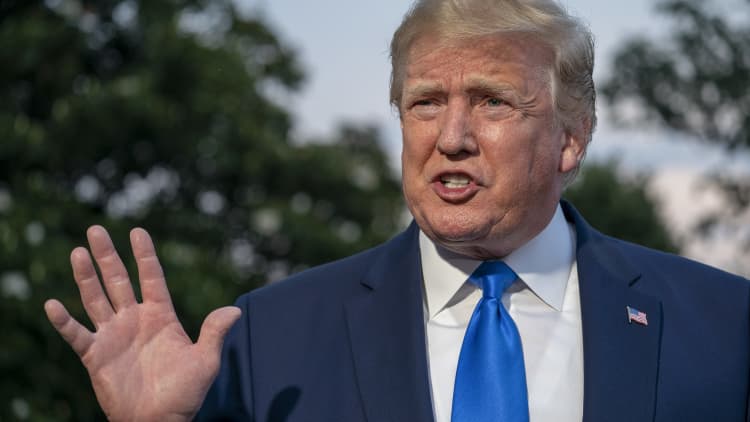
President Donald Trump said China has given itself a "tremendous competitive" advantage by weakening its currency, and the playing field needs to be leveled.
Trump, during a telephone interview with CNBC's "Squawk Box," said the ability of Chinese President Xi Jinping to directly impact monetary policy is an unfair advantage. Trump made the comments as the Chinese yuan traded near its low of the year against the U.S. dollar.
"We should be entitled to have a fair playing field ... because our Fed is very, very disruptive to us," he said. "Even without a fair playing field, we're winning because the tariffs are putting us at a tremendous competitive advantage."
Trump said the U.S. decided not to call China a currency manipulator, but he added there are some who say China has offset its tariffs by letting the currency fall.
"Don't forget, the head of the Fed in China is President Xi. He's the president of China. ... He can do whatever he wants. They devalue, they loosen or you would just say they pump a lot of money into China, and it nullifies to an extent, not fully, it nullifies the tariffs," Trump said.
Trump has repeatedly voiced his frustration with the Federal Reserve for raising interest rates last year, and now for not cutting them. However, many Fed watchers are now forecasting two rate cuts this year, possibly as soon as July.
The Chinese yuan on Monday was near its low of the year, edging closer to 7 to the dollar. That level has become a line in the sand for markets around the world, and if broken, some strategists say it could trigger a negative reaction in risk markets globally, as investors move to price in a bigger impact from a longer, more contentious trade war.
The offshore currency, or CNH, which trades in Hong Kong and is more impacted by international traders, hit a low of 6.946 to the dollar. The onshore yuan, CNY, more controlled by the Chinese central bank, was just above 6.93 Monday, its lowest since November.
Analysts say China had steadied its currency, as talks proceeded with the U.S., but since talks broke down, the currency has weakened more.
"They devalue their currency. They have for years. It's up to them at a tremendous competitive advantage, and we don't have that advantage because we have a Fed that doesn't lower interest rates. We have a Fed that raises interest rates the day before a bond issue goes out, so we have to pay more money," said Trump.
The president did say that China is disadvantaged by the cheaper currency on the global market when it buys things like oil.
On Friday, People's Bank of China Governor Yi Gang told Bloomberg the central bank has refrained from aggressive intervention, and that there is no specific level for the yuan that is important.
"I think the Chinese seem to be accepting a weaker RMB but they're not causing it," said Marc Chandler, Bannockburn Global Forex chief market strategist. The Chinese currency is also known as the Renminbi, or RMB.


